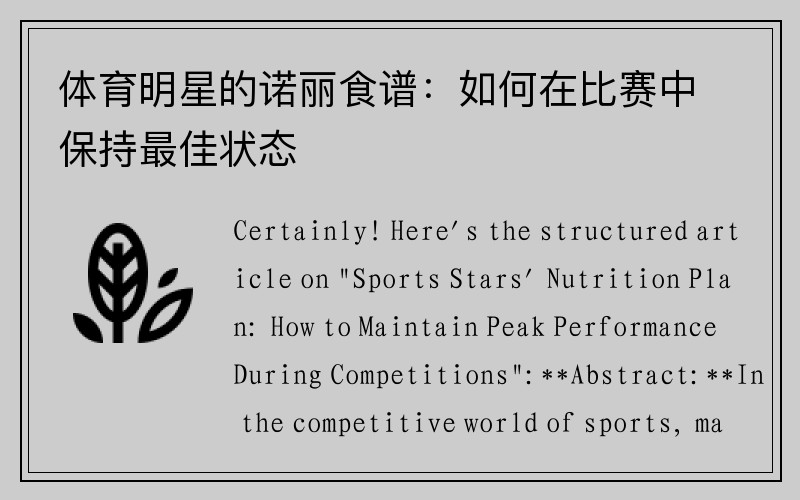体育明星的诺丽食谱:如何在比赛中保持最佳状态
Certainly! Here's the structured article on "Sports Stars' Nutrition Plan: How to Maintain Peak Performance During Competitions":
**Abstract:**
In the competitive world of sports, maintaining peak performance is crucial for athletes. A well-crafted nutrition plan, tailored to their individual needs, plays a pivotal role. This article explores the essential elements of such a plan, focusing on hydration strategies, pre-game meals, in-game fueling, and post-game recovery. By optimizing nutrition, athletes can sustain energy levels, enhance endurance, and maximize their potential on the field or court.
---
**1、Hydration Strategies**
Adequate hydration is fundamental for athletes to perform at their best. Before a competition, athletes should focus on fluid intake to ensure optimal hydration levels. During intense activities, electrolyte-rich drinks help replenish minerals lost through sweat, maintaining proper muscle function and cognitive performance.
During breaks in the game, athletes should continue to hydrate with small, frequent sips rather than consuming large amounts at once. This prevents discomfort and ensures continuous hydration. Post-game, rehydration is crucial to replace fluid losses. Proper hydration supports recovery and prepares athletes for subsequent training sessions or matches.
Electrolyte levels should be monitored to prevent imbalances that can lead to cramping or fatigue. Tailoring hydration plans to individual needs and environmental conditions ensures athletes stay hydrated and perform optimally throughout competitions.
**2、Pre-Game Nutrition**
Pre-game nutrition sets the foundation for performance. Athletes should consume a balanced meal rich in carbohydrates, moderate in protein, and low in fat several hours before competition. Carbohydrates provide readily available energy, while protein supports muscle repair and maintenance.
Choosing easily digestible foods such as whole grains, lean proteins, fruits, and vegetables prevents discomfort during play. Timing is crucial; meals should be consumed early enough to allow for digestion but late enough to ensure energy availability during competition.
Additionally, avoiding foods high in fiber or fat helps prevent gastrointestinal issues that can hinder performance. Tailoring pre-game nutrition to individual preferences and tolerances optimizes energy levels and supports sustained performance on the field.
**3、In-Game Fueling**
Continuous energy supply during games is essential for sustained performance. Athletes benefit from consuming easily digestible carbohydrates, such as sports drinks, energy gels, or fruit, during breaks or halftime.
These snacks provide quick energy without causing digestive discomfort. Timing and quantity are key; small, frequent servings prevent energy dips and maintain focus throughout the game.
g22恒峰官网For endurance sports, maintaining a consistent intake of carbohydrates helps delay fatigue and enhances performance in later stages of the competition. In-game fueling strategies should be practiced during training to ensure athletes can execute them effectively during matches.

**4、Post-Game Recovery**
Effective recovery nutrition begins immediately after competition. Consuming a combination of carbohydrates and proteins within the first 30 minutes supports glycogen replenishment and muscle repair.
Post-game meals should include whole foods such as lean meats, whole grains, and vegetables to provide essential nutrients for recovery. Hydration remains critical; athletes should continue drinking fluids to replace losses and aid in nutrient transport.
Restoring electrolyte balance through sports drinks or electrolyte-rich foods helps prevent cramping and supports overall recovery. Adequate rest and sleep complement nutrition efforts, allowing athletes to recover fully and prepare for future competitions.
**Conclusion:**
The nutritional strategies outlined—hydration management, pre-game nutrition, in-game fueling, and post-game recovery—are essential for athletes striving to maintain peak performance throughout competitions. By tailoring these strategies to individual needs and sport-specific demands, athletes can optimize energy levels, enhance endurance, and maximize their potential on the field or court. Consistent application of these principles not only supports immediate performance but also contributes to long-term athletic success.
In summary, a well-designed nutrition plan is a cornerstone of athletic achievement, ensuring athletes remain at their best when it matters most.